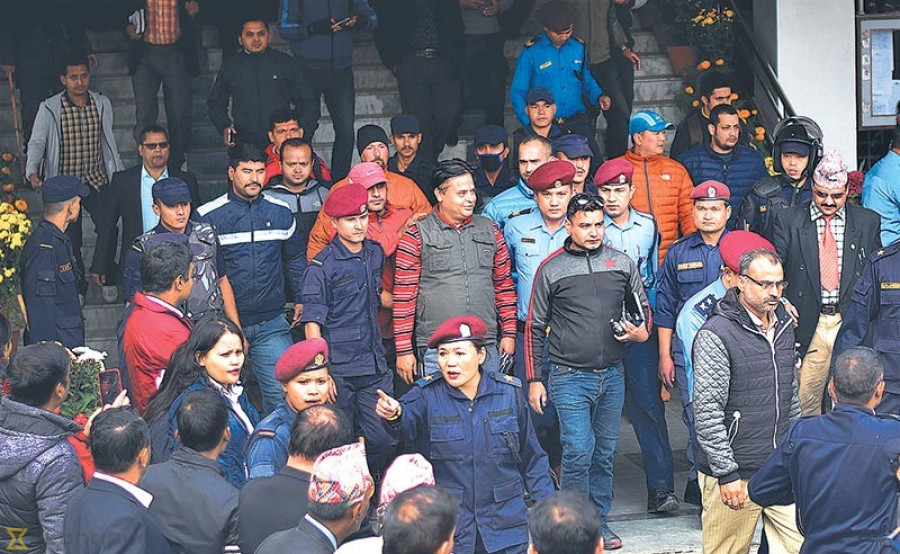National
Arrest of Dhungel raises hope of justice for war-era victims
The arrest of Balkrishna Dhungel on Tuesday for war-era murder has given a glimmer of hope to thousands of victims of the decade-long Maoist insurgency, who have been awaiting justice for over a decade now.
The arrest of Balkrishna Dhungel on Tuesday for war-era murder has given a glimmer of hope to thousands of victims of the decade-long Maoist insurgency, who have been awaiting justice for over a decade now.
Dhungel of Okhaldhunga was convicted by the Supreme Court on Jan 3, 2010 of killing Ujjan Kumar Shrestha of the same district.
It took the state eight years to arrest Dhungel, who enjoyed the patronage of his Maoist party, just as thousands of conflict victims cried for justice.
Sabitri Shrestha, sister of Ujjan, on Tuesday said after Dhungel’s arrest that “finally justice has been served”.
“The arrest of Dhungel has once again raised hopes that the conflict victims will get justice,” said Suman Adhikari, chairperson of the Conflict Victims Common Platform.
Even though the peace agreement that ended the decade-long Maoist war in 2006 envisioned transitional justice mechanisms, it took the state nine long years to form them.
The two transitional justice bodies—the Truth and Reconciliation Commission (TRC) and the Commission of Investigation on Enforced Disappeared Persons (CIEDP)—which are into their third year have become nothing more than a charade, as they have failed to start investigation into over 63,000 complaints they have received.
They are while hamstrung by resource crunch, the government is yet to bring laws in line with international standards as per an order of the Supreme Court.
Dhungel’s is an emblematic case, and his arrest, even though it happened after eight long years since his conviction, could pave the way for expediting the process of ensuring justice to conflict victims. But nonetheless, the CPN (Maoist Centre), which was quick to demand Dhungel’s immediate release, has long been saying that since the incident took place during the insurgency, it has to be dealt with by the transitional justice mechanisms.
More than 16,000 people were killed and thousands were displaced during the 1996-2006 Maoist insurgency. Human rights violations were perpetrate both by the state actors as well as then Maoist rebels.
While Kavre District Court in April this year awarded life imprisonment to three Nepal Army officials for the murder of Maina Sunuwar in 2004, the Army has moved the Supreme Court demanding that the district court verdict be annulled.
Fifteen-year-old Sunuwar was arrested on February 17, 2004 from her home in Kharelthok, Kavrepalanchok, and brought to the Birendra Peace Operations Training Centre in Panchkhal. She later died after severe torture inside the army barracks.
The case of Krishna Prasad Adhikari murder is also pending at Chitwan District Court for years. Adhikari of Fujel, Gorkha was allegedly killed by then Maoist rebels in June 2004. The district court postponed a hearing on the case on Monday—for the 15th time—until December 11.
His father Nanda Prasad Adhikari died life after his 11-month-long hunger strike, demanding action against his son’s killers.
His mother, Gangamaya, has continued her hunger strike.
The tenure of two transitional justice mechanisms was extended for a year in February this year. Their extended term will expire again in a little more than three months.
Conflict victims say they have waited for long and they once again are running out of time.
The implementation of the Supreme Court verdict on Tuesday to send Dhungel to jail, where he will spend 12 years, five months and 22 days, while raises hope, the sluggish approach taken by state actors and political parties to justice delivery continue make conflict victims wary.
“The government should now also facilitate the transitional justice mechanisms to complete their investigation so as to ensure justice to conflict victims,” said Adhikari of the Conflict Victims Common Platform.




 9.83°C Kathmandu
9.83°C Kathmandu













